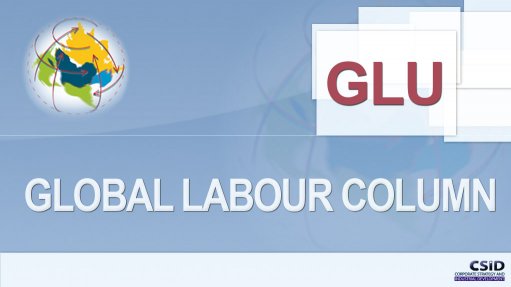
South Africa recently witnessed the birth of the South African Federation of Trade Unions (SAFTU) which held its inaugural congress on 21-23 April 2017 in Johannesburg. The formation of another trade union federation has raised a number of questions, particularly around issues of workers’ unity and the motives behind creating new working class organisations. The context in South Africa is particularly tense; the country tops global inequality rankings, only 30% of formally employed workers are organised, and the memory of the police massacre of 34 mineworkers at Marikana in August 2012 continues to haunt workers and their allies.
In order to capture the complex issues at stake in this important development, this week features three Global Labour Columns by authors representing different sides of the South African labour movement. According to Bheki Ntshalintshali, the General Secretary of COSATU, the question of unity within the trade union movement in South Africa has a long history dating back to the days of the formation of COSATU which was based on the principles of ‘one union, one industry – one country, one federation’. Some unions affiliated to COSATU have at times failed to uphold the ‘one union, one industry’ principle, resulting in competition for members.
Ntshalintshali stresses that this is divisive and weakens the trade union movement while advancing the interests of certain individuals in leadership positions and also serving capitalist interests. In much the same way as Ntshalintshali sees the proliferation of trade unions as inimical to workers’ struggles against capitalism, Alex Mohubetswane Mashilo, head of communications at the South African Communist Party (SACP) and previously a full-time shop steward and appointed trade union official (writing in his personal capacity), argues that divisions in the trade union movement will postpone workers’ victory against capitalist exploitation.
According to Mashilo, the fragmentation of workers movements in South Africa dates back to the establishment of colonial capitalism and was mainly premised on race. Mashilo contends that the new divisions, rather than coming from worker democracy, emerge out of contestations over leadership positions. Lastly, Stephen Faulkner, part of the Operations Centre Coordination of the Committee to Form a New Trade Union Federation in South Africa (but writing in his personal capacity), offers a different perspective.
While acknowledging the fact that the trade union movement in South Africa remains fragmented, Faulkner argues that the formation of a new trade union federation was born out of disillusionment and lack of faith in the existing trade union federations which ‘were increasingly incapable, and even unwilling, to represent the growing needs of workers,’ and had thus become part of the problem confronting workers. Outlining the founding principles of the new federation’s constitution, Faulkner sees SAFTU as the answer to the challenges confronting workers in South Africa.
Global Labour Columns